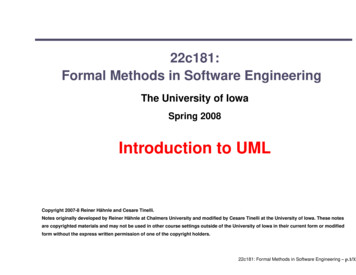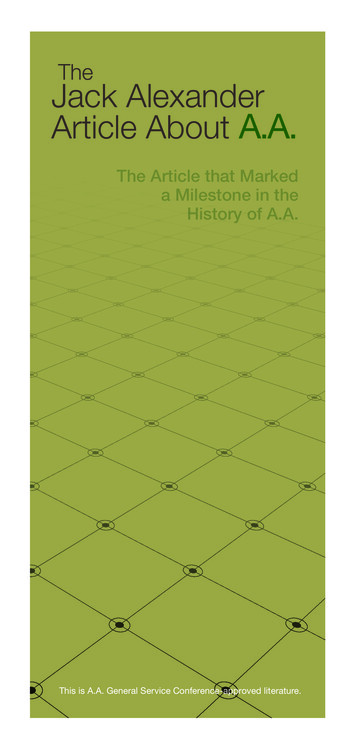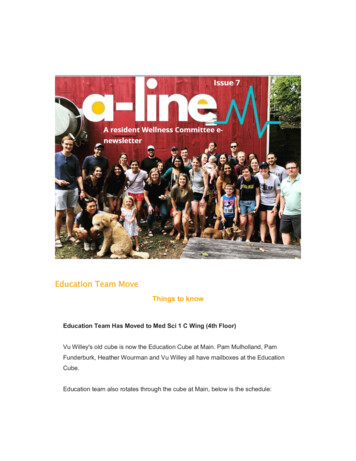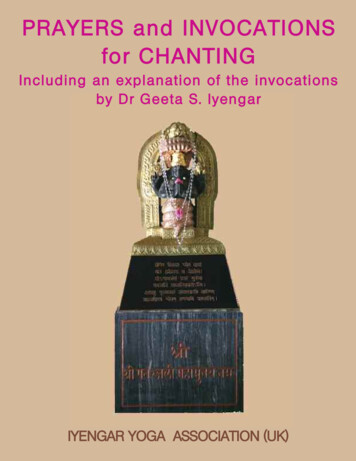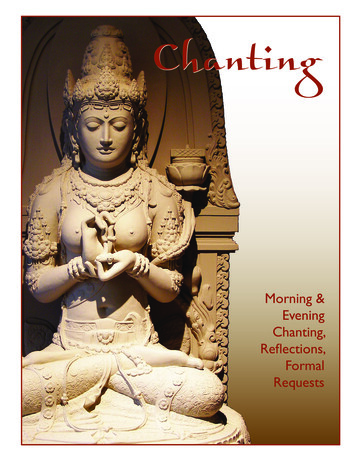
Transcription
ChantingChaMorning &EveningChanting,Reflections,FormalRequests
ChantingMorning & Evening Chanting,Reflections,Formal Requests
This collection consists of chants for daily devotions, reflections, and special ceremonies, which are used bythe Nuns’ Sangha supported by Saranaloka Foundation and their community in the U.S. Most of the chantsin this book are based on a form used in Thailand, with accompanying translations into English; others arenewly added.WE WISH GRATEFULLY TO ACKNOWLEDGE the monastic and lay members of the sangha who have given sogenerously of their time and resources to produce this book:The Amaravati community in the U.K. and the Abhayagiri community in the U.S., for developing theEnglish versions for most of these traditional Buddhist chants and for their kind permission in allowing usto use them.Melanie Ābhassarā Zeki, for establishing most of the tonal system.Dennis Crean, Pamela Kirby, Tracy van Zandt, Daniel Bernstein, Ven. Nyanatusita, and others too numerousto name, for editorial and production assistance with this version.Russell Atkinson, Mary Orr, and the Xerox Corporation, for printing and materials; and Jayce Castell, forbinding the first printing.If you would like to retain a copy of this book for your personal use, you can find a complete downloadableversion at www.saranaloka.org. 2011 by Saranaloka Foundation.
ContentsDaily ChantingMorning Chanting . . . . . . . . . . . . . . . . . . . . . . . . . . . . . . . . . . . . . . . . . . . . . . . . . . . . . . . . . . . . . 7Evening Chanting . . . . . . . . . . . . . . . . . . . . . . . . . . . . . . . . . . . . . . . . . . . . . . . . . . . . . . . . . . . . . 14ReflectionsKaraṇīyamettā Sutta/The Buddha’s Words on Loving-Kindness . . . . . . . . . . . . . . . . . 22/23Caturappamaññā-Obāsanaṃ/The Four Boundless Qualities . . . . . . . . . . . . . . . . . . . . . 24/25Mahāmaṅgala Sutta/The Highest Blessings . . . . . . . . . . . . . . . . . . . . . . . . . . . . . . . . . . . 26/27Brahmavihāra-Pharaṇam/Reflections on Universal Well-Being . . . . . . . . . . . . . . . . . . . . 30Five Subjects for Frequent Recollection . . . . . . . . . . . . . . . . . . . . . . . . . . . . . . . . . . . . . . . . . 31Uddissanādhiṭṭhāna-Gāthayo/Reflections on Sharing Blessings . . . . . . . . . . . . . . . . . 32/33Verses for the Sharing of Merit . . . . . . . . . . . . . . . . . . . . . . . . . . . . . . . . . . . . . . . . . . . . . . . . . 34Reflections on the Four Requisites . . . . . . . . . . . . . . . . . . . . . . . . . . . . . . . . . . . . . . . . . . . . . . 35Ten Subjects for Frequent Recollection by One Who Has Gone Forth . . . . . . . . . . . . . . . . 36Reflection on the Thirty-Two Parts . . . . . . . . . . . . . . . . . . . . . . . . . . . . . . . . . . . . . . . . . . 38/39Āṭānāṭiya Paritta/Twenty-Eight Buddhas’ Protection . . . . . . . . . . . . . . . . . . . . . . . . . . 40/41Aggasāvikā Bhikkhunī/Recollection of the Foremost Arahant Bhikkhunis . . . . . . . . 46/47Dhammacakkappavattana Sutta/Discourse on Setting in Motionthe Wheel of Dhamma . . . . . . . . . . . . . . . . . . . . . . . . . . . . . . . . . . . . . . . . . . . . . . . . . . . 48/49Anattalakkhaṇa Sutta /Discourse on the Characteristic of Not-Self . . . . . . . . . . . . . . 56/57Ādittapariyāya Sutta/Fire Sermon . . . . . . . . . . . . . . . . . . . . . . . . . . . . . . . . . . . . . . . . . . . 62/63Prajñāpāramitā Hṛdaya Sūtram/Heart of Prajña Pāramitā Sutra . . . . . . . . . . . . . . . . 66/67Formal RequestsRequesting a Dhamma Talk/Acknowledging the Teaching . . . . . . . . . . . . . . . . . . . . . . . . . 70Requesting Paritta Chanting . . . . . . . . . . . . . . . . . . . . . . . . . . . . . . . . . . . . . . . . . . . . . . . . . . . 71Requesting the Three Refuges and the Five Precepts . . . . . . . . . . . . . . . . . . . . . . . . . . . . . . 72Requesting the Three Refuges and the Eight Precepts . . . . . . . . . . . . . . . . . . . . . . . . . . . . . 74AppendixPāli Phonetics and Pronunciation . . . . . . . . . . . . . . . . . . . . . . . . . . . . . . . . . . . . . . . . . . . . . . . 78Chanting Technique . . . . . . . . . . . . . . . . . . . . . . . . . . . . . . . . . . . . . . . . . . . . . . . . . . . . . . . . . . 79Glossary . . . . . . . . . . . . . . . . . . . . . . . . . . . . . . . . . . . . . . . . . . . . . . . . . . . . . . . . . . . . . . . . . . . . . 80
Daily Chanting
Morning ChantingDedication of Offerings(Yo so) bhàgavā àrahaṃ sámmāsámbuddhoTo the Blessed and Nòble One, who fully attained pérfect enlìghtenment,Svākkhȴto yena bhàgavátā dhammoTo thè Teaching, which he expòundèd so well,Supaṭìpanno yassa bhàgavàto sāvakàsaṅghoAnd to thè Blessed One’s discíples who have pràcticed well,Tammáyaṃ bhàgavantaṃ sàdhammaṃ sàsaṅghaṃTo these—thè Buddha, thè Dhamma, ànd the Sángha—Imehí sakkārehì yathārahaṃ āropìtehi àbhípūjàyāmaWe render wìth offerings our ríghtful hòmage.Sādhú no bhante bhàgavā sùcira-parinibbùtopiIt is wéll for us that the Blèssed One, having attained �Still had còmpassion for later géneràtions.Ime sakkāre duggàtà-paṇṇākārá-bhūte pàṭiggaṇhātuMay thèse simple ófferings be accèptedAmhȴkaṃ dīghàrattaṃ hìtāya sùkhāyaFor òur long-lasting benefit and fòr the háppiness it gìves us.Àrahaṃ sámmāsámbuddho bhàgavāThè Noble, thè Perfectly Enlíghtened and Blèssed One—Buddhaṃ bhàgavantaṃ àbhívādemiI render homage tò the Búddha, the Blèssed One.(Bow)(Svākkhȴto) bhàgavátā dhammoThè Teaching, so còmpletely expláined by him—Dhammaṃ namassāmiI bòw tò thè Dhàmma.(Bow)(Supaṭìpanno) bhàgavàto sȴvakasáṅghoThè Blessed One’s discíples, who have pràcticed well—Sáṅghaṃ nàmāmiI bòw tò thè Sàngha.(Bow)Preliminary Homage(Hánda mayaṃ buddhassa bhàgavato pubbabhāga-namakȵraṃ karomase)[Nów let us pay preliminary homage to the Bùddha.](Namo tassa) bhàgavato arahàto sámmāsámbuddhàssa(Three times)Hómáge to thè Blèssed, Nóble, ànd Pèrfectly Enlíghtened One. (Three times)Morning Chanting7
Homage to the Buddha(Hánda mayaṃ buddhābhìtthùtiṃ karomase)[Nów let us chant in praise of the Bùddha.](Yo so) tathȴgàto àrahaṃ sámmāsámbuddhoThe Tathāgata is the Púre One, thè Perfectly Enlíghtened One.Vijjācàraṇá-sampannoHe is ìmpeccable ìn conduct and ùnderstánding,SùgàtoThe Accómplished One,LokàvídūThè Knower óf thè Worlds.Anúttàro purisàdamma-sārathiHe trains perfectly thòse who wísh tó bè trained.Satthā deva-mànussānaṃHe is Teacher of dévas and hùmans.Buddho bhàgavāHe is Awake and Hòly.Yo ímaṃ lokaṃ sàdevakaṃ sàmārakaṃ sàbrahmàkaṃIn this world with ìts devas, demons, ànd kind spírits,Sassámaṇa-brāhmaṇiṃ pàjaṃ sàdeva-mànussáṃ sàyaṃ àbhiññā sacchikàtȾā pàvedesiIts séekers and sàges, cèlestial and humán beings, he has by dèep insight revéaledthè Truth.Yo dhammaṃ desési ȵdí-kalyāṇaṃ majjhé-kàlyāṇaṃ pàriyosāna-kàlyāṇaṃHe has pointed out the Dhàmma: beautiful in the begìnning, beautiful in the míddle,beautiful ìn thé end.Sāttháṃ sàbyañjaṇaṃ kevala-pàrípuṇṇaṃ pàrísuddhaṃ brahma-càríyaṃ pàkāsesiHe has explained the Spírítùal Life of còmplete púrity in its éssence and convèntions.Tamaháṃ bhàgavantaṃ àbhípūjàyāmi tamaháṃ bhàgavantaṃ sìrasȴ nàmāmiI chant Ⱥy praise tò the Bléssed One, I bow Ⱥy head tò thé Bléssed One.(Bow)Homage to the Dhamma(Hánda mayaṃ dhammābhìtthùtiṃ karomase)[Nów let us chant in praise of the Dhàmma.](Yo so) svākkhȴto bhàgavátā dhammoThè Dhamma is wèll expóunded by the Blèssed One,SándiṭṭhìkoApparent here ànd now,ÀkālìkoTimeless,8Morning Chanting
EhìpassìkoÈncouraging invèstigátion,OpanayìkoLeading ìnwards,Pàccàttaṃ vedítàbbo viññūhiTo be èxperienced indìvidually bý thè wise.Tamaháṃ dhammaṃ àbhípūjàyāmi tamaháṃ dhammaṃ sìrasȴ nàmāmiI chant Ⱥy praise tò this Téaching, I bow Ⱥy head tò thís Truth.(Bow)Homage to the Sangha(Hánda mayaṃ saṅghābhìtthùtiṃ karomase)[Nów let us chant in praise of the Sàngha.](Yo so) supaṭìpanno bhàgavàto sȴvakasáṅghoThey are thè Blessed One’s discíples, who have pràcticed well,Ujupaṭìpanno bhàgavàto sȴvakasáṅghoWho have practiced dirèctly,Ñāyapaṭìpanno bhàgavàto sȴvakasáṅghoWho have practiced insíghtfully,Sȴmīcìpàṭìpanno bhàgavàto sȴvakasáṅghoThose who práctice with intègrity—Yadidaṃ cattāri purisàyugāni aṭṭhá purisàpuggàlāThat is the fòur pairs, thè eight kinds of nóble beings—Esa bhàgavàto sȴvakasáṅghoThese are thè Blessed One’s discíples.ĀhùṇeyyoSuch ones àre worthy of gifts,PāhùṇeyyoWorthy of hòspitálity,DakkhìṇeyyoWorthy of òfferings,Añjàli-kàráṇīyoWorthy óf rèspect;Anúttàraṃ puññakkhèttaṃ lokassaThey give òccasion for ìncomparable góodness to arìse ìn the world.Tamaháṃ saṅghaṃ àbhípūjàyāmi tamaháṃ saṅghaṃ sìrasȴ nàmāmiI chant Ⱥy praise tò this Sángha, I bow Ⱥy head tò thís Sángha.(Bow)Morning Chanting9
Salutation to the Triple Gem(Hánda mayaṃ ratanattaya-paṇāma-gāthȴyo ceva sáṃvega-parikittana-pāṭhañcà bhaṇāmase)[Nów let us chant our salutation to the Trìple Gem and à passage of encóuragement.](Buddho sùsuddho) kàruṇāmaháṇṇavoThe Bùddha, absolutely pure, with ócean-like �noPossessing thè clear sight of wìsdom,Lokassà pāpūpàkílesà-ghātàkoDestroyer òf worldly sèlf-corrúption—Vandāmí buddhaṃ àhámādàrenà taṃDevotédly ìndeed, that Buddha Í rèvere.Dhammo pàdīpo vìya tassà satthùnoThe Teaching of thè Lord, like a lamp,Yo maggápākāmàtà-bhedà-bhinnàkoIlluminating thè Path and its Fruit: the Dèathless,Lokuttaro yo cà tàdatthà-dīpànoThat which is beyónd the condìtioned world—Vandāmí dhammaṃ àhámādàrenà taṃDevotédly ìndeed, that Dhamma Í rèvere.Sáṅgho sùkhettābhyati-khètta-sáññitoThè Sangha, the mòst fertile gróund for cultivàtion,Yo diṭṭhásanto sùgàtānùbodhàkoThose who have realìzed Peace, awakened after thè Accómplished One,Lolappàhīno àríyo sùmedhàsoNóble ànd wise, all longing abàndoned—Vandāmí saṅghaṃ àhámādàrenà taṃDevotédly ìndeed, that Sangha Í rèvere.Iccevam-ekantàbhípūjà-neyyàkaṃThis salutation should bè madeVatthuttayaṃ vandàyàtābhìsaṅkhàtaṃTo thát which is wòrthy.Puññaṃ màyā yaṃ màmà sabbùpaddàvāThrough thè power of sùch good áction,Mā hóntù ve tassà pàbhāvàsiddhìyāMay àll obstacles dísàppear.Idha tathȴgàto loke ùppanno àrahaṃ sámmāsámbuddhoOne who knows things as thèy are has come intó thìs world, and he is an àrahant,à perfectly awákened being.Dhammo cà desìto niyyānìko ùpàsàmiko pàrinibbānìko sámbodhàgāmī sùgàtappàvedìtoPurifying thè way leading òut òf dèlùsion, calming and dìrecting to pérfect peace,and leading to enlìghtenment—this Way he hás màde known.10Morning Chanting
Máyantaṃ dhammaṃ sùtvā evaṃ jānāmaHaving heard thè Teaching, we knòw this:Jātipì dukkhāBirth is dùkkha,Jarāpì dukkhāAging is dùkkha,Màraṇampì dukkhaṃAnd death is �pì dukkhāSórrow, lamentàtion, pain, grief, and dèspair are dùkkha;Appiyehì sámpàyogo dukkhoAssocìation with thè dìsliked is dùkkha;Piyehì víppàyogo dukkhoSèparátion from thè liked is dùkkha;Yampiccháṃ nà labhati tampì dukkhaṃNot attaining one’s wíshes is dùkkha.Sáṅkhittena pañcùpādānakkhándhā dukkhāIn brief, thè five focuses of the grásping mind are dùkkha.SeyyàthīdaṃThese are as fòllows:RūpūpādānàkkhándhoIdentification with the bòdy,VedanūpādānàkkhándhoIdentification with féeling,SáññūpādānàkkhándhoIdentification with ication with mental ication with cónsciòusness.Yesaṃ pàriññāyaFor thè còmplete understánding of this,Dhàramāno só bhàgavāThè Blessed One in his lìfetimeEvaṃ bàhulaṃ sȴvàke vìnetiFrequently ìnstructed his discíples in just thìs way.Evaṃ bhāgā cà panassa bhàgavàto sȴvàkesu ànusȴsànī bàhulā pàvattàtiIn addition, he fùrthèr ìnstrùcted:Rūpaṃ àniccaṃThe body is impèrmanent,Vedanā àniccāFeeling is impèrmanent,Morning Chanting11
Sáññā àniccāPercéption is impèrmanent,Sáṅkhȴrā àniccāMental formations are impèrmanent,Viññāṇaṃ àniccaṃCónsciousness is impèrmanent;Rūpaṃ ànattāThe body is nòt-self,Vedanā ànattāFeeling is nòt-self,Sáññā ànattāPercéption is nòt-self,Sáṅkhȴrā ànattāMental formations are nòt-self,Viññāṇaṃ ànattāCónsciousness is nòt-self;Sàbbe sáṅkhȴrā àniccāAll conditions are impèrmanent,Sàbbe dhammā ànattā tiThere is nò self in the crèated or the ùncréated.Te máyaṃAll of usOtiṇṇāmha-jātìyā jàrāmaraṇenaAre bound by birth, aging, ànd death,Sókehì pàridevehì dukkhéhì domanassehì ùpāyāsehiBy sórrow, lamentàtion, pain, grief, and dèspair,Dukkhótiṇṇā dukkhàpàretāBóund by dukkha and obstrùctèd by dùkkha.Appevanāmímassà kevalassà dukkhakkhándhassà antàkiríyā paññāyethā tiLet us all àspire to còmplete fréedom from sùffering.Círáparìnibbutampí taṃ bhàgavántaṃ saraṇaṃ gàtāThe Blèssed One, who long ago attained Parinibbȴna, is our rèfuge.Dhámmañca SáṇghañcaSo too are the Dhámma and the Sàngha.Tassa bhàgàvato sȴsanaṃ yathȴsati yathȴbalaṃ manasikàroma ànupaṭipájjāmaAttentively we fóllow the pathway of that Blèssed One, with all of ourmíndfuness ànd strength.Sȴ sȴ no pàṭípattiMay then the cultivátion of this pràcticeImassà kevalassà dukkhakkhándhassà antàkiríyāya sáṃváttàtuLead us to thè end of évery kind of sùffering.12Morning Chanting
(An alternative version of the preceding section, chanted only by bhikkhunis:)Círáparìnibbutampí taṃ bhàgavántaṃ uddissa àrahántaṃ sámmāsámbuddhaṃRemembering the Blèssed One, thè Noble ànd Perfectly Enlíghtened One, who long agoattained Pàrìnìbbȵna,Saddhā àgārasmā anagāríyaṃ pabbàjìtāWe have gone forth wìth faith from home to hómelessness,Tasmíṃ bhàgavati brahma-càríyaṃ càrāmaAnd like the Blèssed One, we practice the Hólỳ Life,Bhikkhunínaṃ síkkhāsȵjīva-samāpannāBeing fully èquipped with the bhikkhùni sýstem of tràining.Taṃ no brahma-càríyaṃ imassà kevalassà dukkhakkhándhassà antàkiríyāya sáṃváttàtuMay this Hòly Life lead us to thè end of évery kind of sùffering.(After a period of silent meditation, additional reflections may be chanted. Then end with the“Closing Homage” below.)Closing Homage(Àrahaṃ) sámmāsámbuddho bhàgavāThè Noble, thè Perfectly Enlíghtened and Blèssed One—Buddhaṃ bhàgavantaṃ àbhívādemiI render homage tò the Búddha, the Blèssed One.(Bow)(Svākkhȴto) bhàgavátā dhammoThè Teaching, so còmpletely expláined by him—Dhammaṃ namassāmiI bòw tò thè Dhàmma.(Bow)(Supaṭìpanno) bhàgavàto sȴvakasáṅghoThè Blessed One’s discíples, who have pràcticed well—Sáṅghaṃ nàmāmiI bòw tò thè Sàngha.(Bow)Morning Chanting13
Evening Chanting (Pˉali)Dedication of Offerings(Yo so) bhàgavā àrahaṃ sámmāsámbuddhoSvākkhȴto yena bhàgavátā dhammoSupaṭìpanno yassa bhàgavàto sȴvakasáṅghoTammáyaṃ bhàgavantaṃ sàdhammaṃ sàsaṅghaṃImehí sakkārehì yathārahaṃ ārópìtehi àbhípūjàyāmaSādhú no bhante bhàgavā �-mānasāIme sakkāre duggàtà-paṇṇākārá-bhūte pàṭiggaṇhātuAmhȴkaṃ dīghàrattaṃ hìtāya sùkhāyaÀrahaṃ sámmāsámbuddho bhàgavāBuddhaṃ bhàgavantaṃ ȵbhívādemi(Bow)(Svākkhȴto) bhàgavátā dhammoDhammaṃ namassāmi(Bow)(Supaṭìpanno) bhàgavàto sȴvakasáṅghoSáṅghaṃ nàmāmi(Bow)Preliminary Homage(Hánda mayaṃ buddhassa bhàgavato pubbabhāga-namakȵraṃ karomase)[Namo tassa] bhàgavato arahàto sámmāsámbuddhàssa(Three times)Recollection of the Buddha(Hánda mayaṃ buddhānùssàtìnayaṃ karomase)[Taṃ khó] pana bhàgavantaṃ evaṃ kalýāṇo kittìsaddo abbhuggàtoItipi so bhàgavā àrahaṃ sámmāsámbuddhoVijjācàraṇá-sampanno sùgàto lokàvídūAnúttàro purisàdamma-sārathi satthā deva-mànussānaṃ buddho bhàgavā tiSupreme Praise of the Buddha(Hánda mayaṃ buddhābhìgȹtiṃ karomase)[Buddhavāràhánta] rúṇāhì sámāgàtattoBodhesì yo sùjànátaṃ kàmálaṃ và sūroVandāmaháṃ tàmaràṇaṃ sìrasȴ jìnendaṃBuddho yo sabbàpāṇīnaṃ sàraṇaṃ khemàmuttàmaṃ14Evening Chanting(Continued on page 16)
Evening Chanting (English)Dedication of Offerings(To the Blessed and Nòble One), whò fully attained pérfect enlìghtenment,To thè Teaching, which he expòundèd so well,And to thè Blessed One’s discíples who have pràcticed well,To these—thè Buddha, thè Dhamma, ànd the Sángha—We render wìth offerings our ríghtful hòmage.It is wéll for us that the Blèssed One, having attained lìberátion,Still had còmpassion for later géneràtions.May thèse simple ófferings be accèptedFor òur long-lasting benefit and fòr the háppiness it gìves us.Thè Noble, thè Perfectly Enlíghtened and Blèssed One—I render homage tò the Búddha, the Blèssed One.(Bow)(Thè Teaching,) so còmpletely expláined by him—I bòw tò thè Dhàmma.(Bow)(Thè Blessed One’s discíples,) who have pràcticed well—I bòw tò thè Sàngha.(Bow)Preliminary Homage(Nów let us pay preliminary homage to the Bùddha.)[Hómáge to thè Blèssed,] Nóble, ànd Pèrfectly Enlíghtened One.(Three times)Recollection of the Buddha(Nów let us chant the recollection of the Bùddha.)[À good word] of thè Blessed One’s rèputátion has spread as fòllows:He, thè Blèssed One, is indeed the Púre One, thè Perfectly Enlíghtened One;He is ìmpeccable ìn conduct and ùnderstánding, the Àccómplished One, thè Knower ófthè Worlds;He trains perfectly thòse who wísh tó bè trained; he is Teacher of dévas and hùmans; he isAwake and Hòly.Supreme Praise of the Buddha(Nów let us chant the supreme praise of the Bud dha.)[Thè Buddha,] thè truly wórthy one, èndowed with such éxcellent quàlities,Whose being is composed of pùrity, transcendental wísdom, and compàssion,Who has ènlightened the wise like thè sun awákening the lòtus—I bow m y head to thàt peaceful chíef of cònquerors.Thè Buddha, who is thè safe, sècure réfuge of al l beings—(Continued on page 17)Evening Chanting15
Pàṭhamānussàtiṭṭhānaṃ vandāmì taṃ sírenàhaṃ(Men chant shaded text)Buddhassȴhàsmi dāsī (dāso) va buddho me sȵmikíssaroBuddho dukkhassà ghātā cà vídhātā cà hítassà meBuddhassāháṃ niyyādemi sàrīrañjīvìtañcìdaṃVandantiháṃ (Vandantoháṃ) càrissāmi buddhassevà súbodhìtaṃNatthi me sàráṇaṃ aññaṃ buddho me sàráṇaṃ vàraṃEtena saccàvajjena vaḍḍheyyaṃ sàtthu-sȴsaneBúddhaṃ me vandàmānāya (vandàmānena) yaṃ puññaṃ pàsútaṃ ìdhaSàbbepi antàrāyā me māhésúṃ tàssá tejàsā(Bowing:)Kāyena vācāya va cetàsȴ vāBúddhe kùkammaṃ pàkátaṃ màyȴ yaṃBúddho pàṭiggaṇhȴtu àccáyantaṃKālantare sáṃvarituṃ và búddheRecollection of the Dhamma(Hánda mayaṃ dhammānùssàtìnayaṃ karomase)[Svākkhȴto] bhàgavátā dhammoSándiṭṭhìko àkālìko ehìpassìkoOpanayìko pàccàttaṃ vedítàbbo viññūhī tiSupreme Praise of the Dhamma(Hánda mayaṃ dhammābhìgītiṃ karomase)[Svākkhȴtàtā] dìguṇa-yogà-vásenà seyyoYo maggàpāka-pàríyattì-vímokkhà-bhedoDhammo kùloka-pàtánā tàdá-dhārì-dhārīVandāmaháṃ tàmahàraṃ vàradhámmàmetaṃDhammo yo sabbàpāṇīnaṃ sàraṇaṃ khemàmuttàmaṃDùtiyānussàtiṭṭhānaṃ vandāmì taṃ sírenàhaṃDhammassȴhàsmi dasi (dāso) va dhammo me sȵmikíssaroDhámmo dukkhassà ghātā cà vídhātā cà hítassà meDhammassāháṃ niyyādemi sàrīrañjīvìtañcìdaṃVandantīháṃ (vandantoháṃ) càrissāmi dhammassevà súdhammàtaṃNatthi me sàráṇaṃ aññaṃ dhammo me sàráṇaṃ vàraṃEtena saccàvajjena vaḍḍheyyaṃ sàtthu-sȴsaneDhammaṃ me vandàmānāya (vandàmānena) yaṃ puññaṃ pàsútaṃ ìdhaSàbbepi antàrāyā me māhésúṃ tàssá tejàsā(Bowing:)Kāyena vācāya va cetàsȴ vāDhámme kùkammaṃ pàkátaṃ màyȴ yaṃDhámmo pàṭiggaṇhȴtu àccáyantaṃKālantare sáṃvarituṃ và dhámme16Evening Chanting(Continued on page 18)
As thè First Object of Rècolléction, Ì venerate him with bówed head.I am indeed the Buddha’s sèrvant, thè Buddha is my Lórd ànd Guide.Thè Buddha is sorrow’s destròyer, who bestows bléssíngs òn me.To thè Buddha I dédicate this bòd̀y and life,And in dèvotion I wìll walk the Buddha’s páth of àwàkening.For me there is no other rèfuge, thè Buddha is my éxcellènt rèfuge.By thè utterance of thìs truth, may I grow in the Mástèr’s Way.By my dèvotion to the Bùddha, and thè blessing of this práctice—By ìts power, may àll obstacles be óvèrcome.(Bowing:)By body, speech, òr mind,For whatever wròng action I have còmmitted towards the Bùddha,May my àcknowledgement of fault be accépted,That ìn the future there may be rèstraint regarding the Bùddha.Recollection of the Dhamma(Nów let us chant the recollection of the Dhàmma.)[Thè Dhamma] is wèll expóunded by the Blèssed One,Apparent here ànd now, timeless, èncouraging invèstigátion,Leading ìnwards, to be èxperienced indìvidually bý thè wise.Supreme Praise of the Dhamma(Nów let us chant the supreme praise of the Dhàmma.)[It is éxcellent] bècause it is wèll expóunded,And it can be dìvided intò Path and Fruit, Practice and Lìberátion.Thè Dhamma holds those who ùphold it from fàlling intò delúsion.I revere thè excellent téaching, that which removes dàrkness—Thè Dhamma, which is the sùpreme, sècure réfuge of àll beings—As thè Second Object of Rècolléction, Ì venerate it with bówed head.I am indeed the Dhamma’s sèrvant, thè Dhamma is my Lórd ànd Guide.Thè Dhamma is sorrow’s destròyer, and it bestows bléssíngs òn me.To thè Dhamma I dédicate this bòd̀y and life,And in dèvotion I wìll walk this excellent wáy òf Truth.For me there is no other rèfuge, thè Dhamma is my éxcellènt rèfuge.By thè utterance of thìs truth, may I grow in the Mástèr’s Way.By my dèvotion to the Dhàmma, and thè blessing of this práctice —By ìts power, may àll obstacles be óvèrcome.(Bowing:)By body, speech, òr mind,For whatever wròng action I have còmmitted towards the Dhàmma,May my àcknowledgement of fault be accépted,That ìn the future there may be rèstraint regarding the Dhàmma. (Continued on page 19)Evening Chanting17
Recollection of the Sangha(Hánda mayaṃ saṅghānùssàtìnayaṃ karomase)[Supaṭìpanno] bhàgavàto sȴvakasáṅghoUjupaṭìpanno bhàgavàto sȴvakasáṅghoÑāyapaṭìpanno bhàgavàto sȴvakasáṅghoSȴmīcìpàṭìpanno bhàgavàto sȴvakasáṅghoYadidaṃ cattāri purisàyúgāni aṭṭhá purisàpuggàlāEsa bhàgavàto sȴvakasáṅghoĀhùṇeyyo pāhùṇeyyo dakkhìṇeyyo añjàli-kàráṇīyoAnúttàraṃ puññakkhèttaṃ lokassā ti(Men chant shaded text)Supreme Praise of the Sangha(Hánda mayaṃ saṅghābhìgȹtiṃ karomase)[Sàddhammajo] supaṭipattìgúṇābhìyuttoYoṭṭhabbìdho -pàvarāsàyá-kāyà-cittoVandāmaháṃ tàmarìyānà gaṇáṃ sùsuddhaṃSáṅgho yo sabbàpāṇīnaṃ sàraṇaṃ khemàmuttàmaṃTàtiyānussàtiṭṭhānaṃ vandāmì taṃ sírenàhaṃSaṅghassȴhàsmi dāsī (dāso) va saṅgho me sȵmikíssaroSáṅgho dukkhassà ghātā cà vídhātā cà hítassà meSaṅghassāháṃ niyyādemi sàrīrañjīvìtañcìdaṃVandantīháṃ (Vandantoháṃ) càrissāmi saṅghasso-pàṭípannàtaṃNatthi me sàráṇaṃ aññaṃ sáṅgho me sàráṇaṃ vàraṃEtena saccàvajjena vaḍḍheyyaṃ sàtthu-sȴsaneSáṅghaṃ me vandàmānaya (vandàmānena) yaṃ puññaṃ pàsútaṃ ìdhaSàbbepi antàrāyā me māhésúṃ tàssá tejàsā(Bowing:)Kāyena vācāya va cetàsȴ vāSáṅghe kùkammaṃ pàkátaṃ màyȴ yaṃSáṅgho pàṭiggaṇhȴtu àccáyantaṃKālantare sáṃvarituṃ và sáṅghe(At this time meditation is practiced in silence, sometimes followed by a Dhamma talk, ending withthe “Closing Homage” on page 20.)18Evening Chanting
Recollection of the Sangha(Nów let us chant the recollection of the Sàngha.)[They are thè Blessed One’s discíples,] who have pràcticed well,Who have practiced dirèctly,Who have practiced insíghtfully,Those who práctice with intègrity—That is the fòur pairs, thè eight kinds of nóblè beings—These are thè Blessed One’s discíples.Such ones àre worthy of gifts, worthy of hòspitálity, worthy of òfferings, worthy óf rèspect;They give òccasion for ìncòmparable góodness to arìse ìn the world.Supreme Praise of the Sangha(Nów let us chant the supreme praise of the Sàngha)[Born òf the Dhámma,] thàt Sangha which has práctìced well,The field of thè Sangha formed òf eight kinds of nóblè beings,Guided in body ànd mind b̀y excellent morálity and vìrtue.I revere that àssembly of nóble beings pèrfected in pùrity.Thè Sangha, which is the sùpreme, sècure réfuge of àll beings—As thè Third Object of Rècolléction, Ì venerate it with bówed head.I am indeed the Sangha’s sèrvant, thè Sangha is my Lórd ànd Guide.Thè Sangha is sorrow’s destròyer and it bestows bléssíngs òn me.To thè Sangha I dédicate this bòd̀y and life,And in dèvotion I wìll walk the well-practiced wáy of thè Sàngha.For me there is no other rèfuge, thè Sangha is my éxcellènt rèfuge.By thè utterance of thìs truth, may I grow in the Mástèr’s Way.By my dèvotion to the Sàngha, and thè blessing of this práctice—By ìts power, may àll obstacles be óvèrcome.(Bowing:)By body, speech, òr mind,For whatever wròng action I have còmmitted towards the Sàngha,May my àcknowledgement of fault be accépted,That ìn the future there may be rèstraint regarding the Sàngha.(At this time meditation is practiced in silence, sometimes followed by a Dhamma talk, ending withthe “Closing Homage” on page 20.)Evening Chanting19
Closing Homage (Pˉali)(Àrahaṃ) sámmāsámbuddho bhàgavāBuddhaṃ bhàgavantaṃ àbhívādemi(Bow)(Svākkhȴto) bhàgavátā dhammoDhammaṃ namassāmi(Bow)(Supaṭìpanno) bhàgavàto sȴvakasáṅghoSáṅghaṃ nàmāmi(Bow)Closing Homage (English)(Thè Noble,) thè Perfectly Enlíghtened and Blèssed One—I render homage tò the Búddha, the Blèssed One.(Bow)(Thè Teaching,) so còmpletely expláined by him—I bòw tò thè Dhàmma.(Bow)(Thè Blessed One’s discíples,) who have pràcticed well—I bòw tò thè Sàngha.(Bow)20Evening Chanting
Recollections
Karan.ˉıyamettˉa Sutta (Pˉali)(Karaṇīyamatthakusálena)Yantaṃ santaṃ pàdaṃ abhisameccàSakko ùjū ca sūjū càSuvaco cassà mudu anatímānīSantussàko ca subbaro càAppàkicco cà sallahukávuttìSantindrìyo cà nìpàko càAppàgabbho kùlesu ananúgiddhoNà cà khuddhaṃ sàmācàre kiñcìYena viññū pàre upavádeyyuṃSùkhìno vā khemìno hontùSàbbe sattā bhàvantu sukhítattāYe kecì pāṇàbhūtatthìTàsā vā thāvàrā vā ànàvàsesāDīghā vā ye màhantā vāMajjhìmā rassàkāṇukáthūlāDiṭṭhā vā ye cà adiṭṭhāYe cà dūre vasanti avídūreBhūtā vā sambhàvesī vāSàbbe sattā bhàvantu sukhítattāNà pàro pàraṃ nikubbethàNātìmaññethà katthàcì naṃ kiñcìByārosànā pàṭighásaññāNāññàmaññassà dukkhàmiccheyyàMātā yàthā nìyaṃ puttaṃĀyùsā ekàputtamanúrakkheEvampì sabbàbhūtesùMānàsaṃ bhāvàye aparímāṇaṃMettañcà sabbàlokasmiṃMānàsam bhāvàye aparímāṇaṃUddhaṃ àdho cà tìrìyañcàÀsambādhaṃ àveraṃ àsàpattaṃTiṭṭhaṃ càraṃ nisinno vāSàyāno vā yāvàtassa vigatámiddhoEtaṃ sàtiṃ àdhiṭṭheyyàBrahmàmetaṃ vìhāraṃ ìdhàmāhùDiṭṭhiñcà ànùpàgammaSīlávā dassànena sampannoKāmesù vìneyyà gedhaṃNà hì jātù gabbhàseyyaṃ punaretȸ ti22Reflections
The Buddha’s Words on Loving-Kindness (English)(Now let us chant the Buddha’s words on loving-kìndness.)[This is what should bè done]By one whò is skílled in gòodness and who knows the pàth of peace:Let them bè able and úpright,Stràightforward and gentlé ìn speech,Humble and not concèited,Còntented and éasily sàtisfied,Unburdened with dùties and frugal ín thèir ways.Peaceful and calm, ànd wise and skíllful,Nòt proud and demánding in nàture.Let them not dò the slíghtèst thingThat thè wise would latér rèprove,Wishing: In gladness ànd in sáfety,May àll beings bé àt ease.Whatever livìng beings there mày be,Whether thèy are wéak òr strong, omìtting none,The great or the mìghty, medium, shórt, òr small,The seen and the ùnseen,Those living near and fár àway,Those born and tò bé born,May àll beings bé àt ease.Let none deceivè ànòtherOr dèspise anỳ being in ánỳ state.Let none through anger or ìll-willWish hárm upon anòther.Even as à mother protects with hèr lifeHer child, her ònlý child,So with a bóundless heartShould òne cherish all lívìng beings,Radiating kíndness over thè entírè world,Spreading upwards to the skíes and dòwnwàrds tò thé depths,Outwards and unbòunded,Frèed from hátréd and ìll-will.Whether standing or wàlking, seated or lýìng down,Free from dròwsiness,One should sùstain this rècolléction.This is said tò be thè sublíme abìding.By not holding to fìxed views,Thè pure-héartèd one, having clarity of vìsion,Being freed fròm all sénse-desires,Is not bórn ágain intò this world.Reflections23
Caturappamaññˉa-Obhˉasanam (Pˉali)(Hánda mayaṃ caturappamaññā obhāsanaṃ karomase)[Mettā-sàhàgàtena] cetasā ekaṃ disaṃ phàrìtȿā vihàràtiTáthā dutiyaṃ tàthā tatiyaṃ tàthā càtutthaṃIti uddhamadho tiriyaṃ sabbàdhì sabbattàtāyaSabbāvantaṃ lokaṃ mettā-sàhàgàtena cetasāVipulena mahaggàtena appàmāṇena àverena àby āpajjhena phàrìtȿā vihàràtiKarúṇā-sàhàgàtena cetasā ekaṃ disaṃ phàrìtȿā vihàràtiTáthā dutiyaṃ tàthā tatiyaṃ tàthā càtutthaṃIti uddhamadho tiriyaṃ sabbàdhì sabbattàtāyaSabbāvantaṃ lokaṃ kàrùṇā-sàhàgàtena cetasāVipulena mahaggàtena appàmāṇena àverena àby āpajjhena phàrìtȿā vihàràtiMudítā-sàhàgàtena cetasā ekaṃ disaṃ phàrìtȿā vihàràtiTáthā dutiyaṃ tàthā tatiyaṃ tàthā càtutthaṃIti uddhamadho tiriyaṃ sabbàdhì sabbattàtāyaSabbāvantaṃ lokaṃ mùdìtā-sàhàgàtena cetasāVipulena mahaggàtena appàmāṇena àverena àby āpajjhena phàrìtȿā vihàràtiUpekkhā-sàhàgàtena cetasā ekaṃ disaṃ phàrìtȿā vihàràtiTáthā dutiyaṃ tàthā tatiyaṃ tàthā càtutthaṃIti uddhamadho tiriyaṃ sabbàdhì sabbattàtāyaSabbāvantaṃ lokaṃ ùpèkkhā-sàhàgàtena cetasāVipulena mahaggàtena appàmāṇena àverena àby āpajjhena phàrìtȿā vihàràtī ti24Reflections
The Four Boundless Qualities (English)(Now let us make the Four Boundless Qualities shìne forth.)I wíll abide pervading oǹe quarter with a mind imbued with loving-kíndness,Likewíse the second, likewíse the third, likewise thè fourth,So above and bèlow, around and évery where, and to áll ás to my self.I wíll abide pervading the all-encompássing worldwith a mind imbued with loving-kìndness:Abúndant, exálted, immèasurable, without hòstility, and without ìll-will.I wíll abide pervading oǹe quarter with a mind imbued with compássion,Likewíse the second, likewíse the third, likewise thè fourth,So above and bèlow, around and évery where, and to áll ás to my self.I wíll abide pervading the all-encompássing worldwith a mind imbued with compàssion:Abúndant, exálted, immèasurable, without hòstility, and without ìll-will.I wíll abide pervading oǹe quarter with a mind imbued with gládness,Likewíse the second, likewíse the third, likewise thè fourth,So above and bèlow, around and évery where, and to áll ás to my self.I wíll abide pervading the all-encompássing worldwith a mind imbued with glàdness:Abúndant, exálted, immèasurable, without hòstility, and without ìll-will.I wíll abide pervading oǹe quarter with a mind imbued with equanimíty,Likewíse the second, likewíse the third, likewise thè fourth,So above and bèlow, around and évery where, and to áll ás to my self.I wíll abide pervading the all-encompássing worldwith a mind imbued with equanìmity:Abúndant, exálted, immèasurable, without hòstility, and wi
This collection consists of chants for daily devotions, reflections, and special ceremonies, which are used by the Nuns’ Sangha supported by Saranaloka Foundation and their community in the U.S. Most of the chants in this book are based on a form used in Thailand, with accomp






